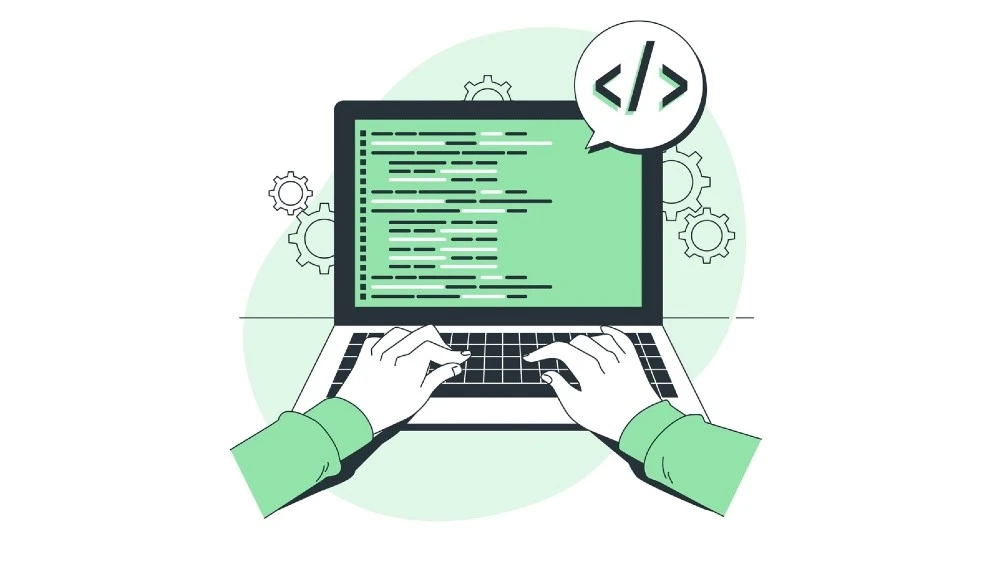The Power Of Java: A Comprehensive Guide to Understanding and Using the Programming Language
Since its very first moment, Java has become a popular and widely used programming language, loved and appreciated by developers working in all kinds of domains. And while some say that the times have changed and Java is dead, it’s very much alive and striving. On this page, we’ll take a look at every aspect of Java programming, so if you want to know what it is, how to use it, and why opt for it for your project, this is the text to read.
Image by macrovector on Freepik
The History of Java
Java language has a rich history that started in the early 1990s, when a team of developers at Sun Microsystems, led by James Gosling, started a project called "Green." Gosling's team planned to create a programming language that would be simple, secure, and platform-independent — and the plan soon turned into reality.
In 1995, they finally released Java to the world. With its "write once, run anywhere" motto, Java immediately revolutionized the software industry, allowing developers to write code once and deploy it on any system with a Java Virtual Machine installed. Over the following years, Java has evolved and adapted to the industry’s changing needs, with new versions and features, regular updates, and constantly improving performance.
Today, Java remains a strong force in the programming world, powering all kinds of software, from large enterprise systems to mobile apps.
Java's Key Features and Strengths
Java is very popular among developers and businesses, and there is a reason for it — or several reasons, to be precise. Here are some of the language's key powers and highlights that make people opt for Java programming again and again.
Write Once, Run Anywhere (WORA) concept
One of Java's most prominent strengths is its "write once, run anywhere" concept. It allows developers to write code on one platform and run it on any system with a Java Virtual Machine (JVM). The platform independence is achieved by compiling Java source code into bytecode, which can then be executed pretty much anywhere. With this unique feature, developers can create applications that will seamlessly run on different operating systems, reducing the need for extensive platform-specific adjustments.
Java Virtual Machine (JVM)
The Java Virtual Machine is an essential component of the Java Runtime Environment. It acts as a bridge between the Java program and the computer's hardware and operating system. The JVM interprets the code and converts it into a format that the system can understand, ensuring that Java programs seamlessly run on various platforms. Thanks to the JVM, Java applications are portable and reliable in different environments.
Object-oriented programming (OOP) principles in Java
Java is built on the strong support for object-oriented programming principles. It uses a class-based structure that allows developers to create reusable code components — objects. These objects are organized using core OOP concepts like encapsulation, inheritance, and polymorphism. By applying these principles, developers can create well-structured, maintainable, and adaptable applications that can easily adapt to changing requirements.
Garbage collection and exception-handling
Another thing that sets Java apart from other programming languages is its built-in garbage collection mechanism. With automatic memory management, Java relieves developers from explicitly managing memory allocation and deallocation. The garbage collector identifies and frees up memory that is no longer in use, reducing the risk of memory leaks and improving application performance. Additionally, Java's robust exception-handling mechanism allows developers to gracefully handle errors and exceptions during runtime. Thus, the application always maintains stability and operates reliably.
Different Versions of Java and Their Features
Java has come a long way, and various versions of the language have been introduced. And each of them brought new features and improvements to the table.
The first Java version worth mentioning is Java SE (Standard Edition), which provides the core functionality and libraries for general-purpose development. With each new release, Java SE improves its performance, security, and developer productivity. Features like lambda expressions, introduced in Java 8, allow developers to write more concise and expressive code. In its turn, Java 11 brought the Java Platform Module System (JPMS), providing a modular structure for organizing and managing Java applications.
Java EE (Enterprise Edition) is another significant version of Java that focuses on enterprise-scale applications. It includes features such as Java Servlet API for web development, Java Persistence API (JPA) for database access, and Java Messaging Service (JMS) for messaging between components. Over time, Java EE has gone through several updates, and with the latest versions, it has transitioned to the Eclipse Foundation under the name Jakarta EE.
Furthermore, Java has expanded its reach to mobile and embedded systems with Java ME (Micro Edition) and Java Card. Java ME allows the development of mobile applications, while Java Card provides a platform for developing secure smart card applications.
Java Basics: Syntax, Data Types, Variables, and Operators
To develop reliable and efficient code, it’s essential to understand Java's fundamental concepts. We won’t be able to teach you the whole programming language in a single article — there are plenty of other resources for that — we’ll just touch the surface of Java's grounds.
- Syntax. Java follows a structured syntax that includes rules and conventions for organizing statements, blocks, and comments. By adhering to these syntax guidelines, developers can ensure their code is easily understood and maintainable.
- Data Types. The language supports a wide range of data types, including primitive and reference types. Primitive data types (int, boolean, and double) handle basic values, while reference data types (classes, arrays, and strings) represent complex objects.
- Variables. Variables play a vital role in Java programming as they store and manipulate data. They are declared with a specific data type and can hold values that match that type. They provide a way for developers to temporarily or permanently store information, enabling them to process and manipulate data within a program.
- Operators. Java provides a comprehensive set of operators for performing various operations on data. These operators include arithmetic operators (+, -, *, /, %), assignment operators (=, +=, -=, *=, /=), comparison operators (==, !=, <, >, <=, >=), logical operators (&&, ||, !), and bitwise operators.
Understanding the basic principles will lay a solid start for your programming journey if coding yourself is what you’re striving for. And if you’d rather have someone do the job for you, Java experts in Fetocan are always here to help.
Java Development Kit: Getting Started With Java Programming
The Java Development Kit (JDK) is the essential starting point for anyone interested in Java programming. Whether for beginners or more experienced developers, getting familiar with the JDK is crucial.
The JDK includes all the tools and resources needed to develop and run Java applications. It provides the Java compiler (javac), which translates human-readable Java code into bytecode understood by the Java Virtual Machine. Additionally, the JDK offers a wide range of libraries and APIs, like the Java Class Library, which provides ready-made components to simplify application development.
The Java programming journey with the JDK starts with a single step — installing it on your system. The installation process is straightforward and varies depending on the operating system. Once it is installed, a developer can use Integrated Development Environments (IDEs) like Eclipse, IntelliJ IDEA, or NetBeans to write, debug, and test the Java code more efficiently.
Image by vectorjuice on Freepik
Exploring the Java Ecosystem: Oracle Java, Open-Source Alternatives, and Frameworks
In the Java ecosystem, developers have a range of options and alternatives to choose from based on their needs:
Oracle Java. Oracle Java serves as the official implementation of the Java platform, providing comprehensive support, regular updates, and a bunch of tools and resources. It is a popular choice for its stability and rich feature set that allows developers to build powerful and scalable applications, as well as for the extensive ecosystem and documentation provided by Oracle.
Open-Source Options. OpenJDK is an open-source implementation of the Java platform. It is maintained by a dedicated community and allows developers to view and contribute to its source code. OpenJDK provides a flexible and customizable Java environment that can be tailored to specific project needs.
Frameworks. Frameworks play a crucial role in simplifying and speeding up the development process in the Java ecosystem. One widely adopted framework is Spring, which provides an infrastructure for enterprise-scale Java applications. Spring offers features like dependency injection, aspect-oriented programming, and support for various modules and extensions. Another prominent framework in the Java ecosystem is Jakarta EE (formerly Java EE). It is a collection of APIs and specifications that enable developers to build distributed systems, handle database operations, and manage transactional processes effectively.
Where to Use Java
There are many things that you can build with Java, but in some cases, the language can be especially fitting. If you are looking to build something out of this list, it can be a perfect programming language for your needs (however, it always depends on the specific requirements).
- Enterprise applications. Java’s scalability, reliability, and support for distributed computing make it an excellent option for building enterprise-scale applications. The language is well-suited for creating enterprise resource planning (ERP) systems, CRM platforms, and supply chain management software. It can handle complex business logic and seamlessly integrate with backend systems, making it a valuable tool for building robust enterprise applications.
- Web development. Frameworks like Spring and JavaServer Faces (JSF) offer powerful features and tools for building web applications. Java's support for server-side technologies, such as JavaServer Pages (JSP) and servlets, enables the creation of dynamic and interactive web experiences. The language is commonly used in developing content management systems, e-commerce platforms, and web-based portals, where its versatility and scalability shine at its finest.
- Mobile development. Java's compatibility with the Android platform makes it a top choice for mobile app development. By using the Android Software Development Kit and Java programming, developers can create feature-rich and cross-platform mobile applications that cater to a vast user base, while the object-oriented nature of the language and its extensive libraries speed up the development process.
- Big Data processing. Java offers a range of powerful tools and frameworks for efficiently processing and analyzing large amounts of data, with the most popular ones being Apache Hadoop and Apache Spark. The language’s scalability, fault-tolerance, and concurrency capabilities make it an ideal choice for developing data-intensive applications and performing complex data analytics tasks.
- Scientific computing. Java is often used in scientific and computational domains, as libraries like Apache Commons Math and Weka offer a wide set of mathematical and statistical functions. Its ability to handle complex computations, along with its platform independence, makes it suitable for scientific simulations, data analysis, and machine learning tasks.
- IoT. Java's platform independence and extensive libraries make it a strong contender for Internet of Things development. The lightweight frameworks like Eclipse IoT and libraries like Pi4J provide tools and APIs for developing top-performing IoT applications. With Java, developers can create IoT solutions for smart homes, industrial automation, and connected devices, leveraging its security, network support, and interoperability.
Future of Java
While Java's past is bright, its future is no less sparkling. The language continues to evolve and adapt to meet industry demands. Is it going to remain relevant? With the following factors, it’s almost a 100% guarantee.
- Language enhancements. Java regularly introduces updates with new features, improved performance, and enhanced security.
- Cloud-native development. The language is well-suited for building scalable and distributed cloud-native applications.
- Modularization and microservices. Java's modularization efforts allow the development of modular and independently deployable microservices.
- Machine learning and data science. The language is constantly expanding its support for machine learning and data science with dedicated libraries and frameworks.
- Internet of Things (IoT). Java's platform independence and security features make it ideal for IoT development.
- Community support. Java benefits from a strong community of professional developers, ensuring ongoing support and growth.
Conclusion
Java is a dynamic and highly favored programming language that has proven its worth over the years. It has garnered immense popularity among developers from diverse fields thanks to its impressive capabilities and extensive resources. Its ability to run seamlessly across different platforms, coupled with its strong focus on object-oriented programming, automatic memory management, and a thriving community, ensures its continued relevance in the ever-evolving tech landscape. As we embrace future advancements, Java stands tall, ready to adapt and empower developers with its reliability and forward-thinking nature.
FAQ
What are the main things to know about Java?
Java is a versatile, platform-independent language with strong support for object-oriented programming, automatic memory management, and a rich library ecosystem. Developers specifically value it for its “write once, run anywhere” principle.
Is Java better than other programming languages?
The superiority of a programming language depends on a specific project’s requirements, but Java's strengths often make it the first choice for many businesses.
Where do I find the best Java developers?
While the competition is strong, finding skilled and reliable developers might be a challenge. Here in Fetocan, we provide high-quality development services at a competitive price and will be glad to take on your project.











